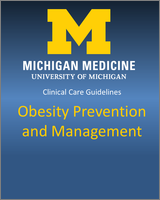From: Obesity Prevention and Management

Obesity Prevention and Management.
Orringer KA, Van Harrison R, Nichani SS, et al.
Ann Arbor (MI): Michigan Medicine University of Michigan; 2020 Jun.
© Regents of the University of Michigan.
Except where otherwise noted, this work is licensed under a Creative Commons Attribution-NonCommercial-ShareAlike 4.0 International License. To view a copy of this license, visit https://creativecommons.org/licenses/by-nc-sa/4.0/
NCBI Bookshelf. A service of the National Library of Medicine, National Institutes of Health.